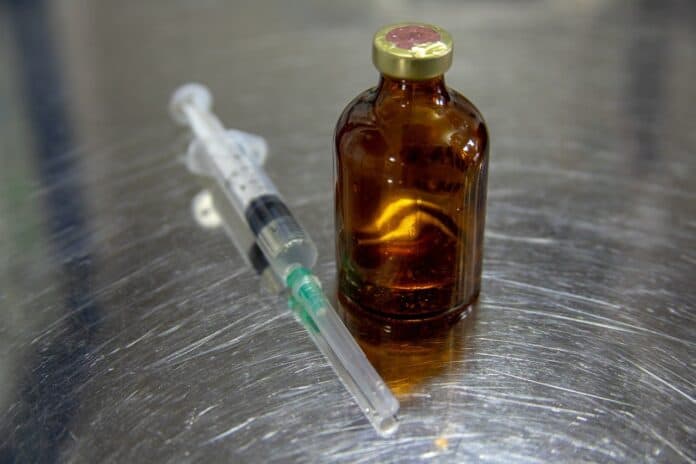Last Updated on December 13, 2020 by The Health Master
The Vulture Conservation Breeding Centre (VCBC), Haryana has recommended to the Union health ministry to ban non-steroidal anti-inflammatory drug (NSAID) aceclofenac for veterinary use in the wake of its misuse leading to vulture mortality.
Aceclofenac is a NSAID given to cattle to treat pain and inflammation and its irrational use and misuse for veterinary use has become rampant in many parts of India.
Earlier, Government of India had prohibited ‘Diclofenac and its formulations for animal use’ vide notification No. G.S.R 499 (E) dated July 4, 2008 and permitted ‘Diclofenac injection for human use shall be in single unit dose pack only’ vide notification No. G.S.R 558(E) dated July 17, 2015.
To download above notifications, click below links
Notification No. G.S.R 499 (E) dated July 4, 2008
Notification No. G.S.R 558(E) dated July 17, 2015
The VCBC Haryana had earlier played an important role in confirming that diclofenac, a NSAID, given to cattle to treat pain and inflammation, was the main cause of vulture mortality and population crash in vultures.
Also read | Govt to exempt BA/BE studies for these Drugs
Anti-inflammatory painkillers like aceclofenac are also called non-steroidal anti-inflammatory drugs (NSAIDs), or sometimes just ‘anti-inflammatories’. Aceclofenac is also prescribed for people with painful rheumatic conditions such as osteoarthritis, rheumatoid arthritis and ankylosing spondylitis.
The VCBC is a joint project of the Haryana Forest Department and the Bombay Natural History Society (BNHS). It is a collaborative initiative to save the three species of vultures, the White-backed, Long-billed and Slender-billed, from looming extinction.
It has been recommended that banning aceclofenac will also be contributing towards Prime Minister’s flagship programme “Swatchha Bharat Abhiyaan”.
Drugs Consultative Committee (DCC) under the union health ministry after detailed deliberations has also recommended for making provisions in the drug rules for prohibition of aceclofenac for veterinary use to save vultures.
As per scientific studies, there is evidence for the toxicity to vultures of six other than diclofenac, namely aceclofenac, carprofen, flunixin, ketoprofen, nimesulide and phenylbutazone. NSAID is a drug class that reduces pain, decreases fever, prevents blood clots, and in higher doses, decreases inflammation.
In view of the same, the VCBC has requested the appropriate action in this matter for prohibition of aceclofenac for veterinary use for saving vultures.
Also read | Pharma industry seeks support from the Govt on MEIS
DCC has been apprised that, Principal Scientist and Deputy Director, BNHS, VCBC, Panchkula, Haryana has given a research note on ‘Metabolism of aceclofenac in cattle to vulture killing diclofenac’.
DCC has also been apprised that in its 56th meeting last year deliberated the matter and recommended State Drugs Controller (SDC), Food and Drugs Administration (FDA) Haryana to write a letter to Principal Scientist and Deputy Director, BNHS, VCBC to provide detailed supporting scientific data in this regard for further action. Accordingly, upon request said research paper has been received and kept for review of the committee.
SDC, FDA Haryana NK Ahooja has apprised DCC on how the aceclofenac and diclofenac are posing problems for the survival of vultures leading to the environmental issue due to the dead forest animals, since vultures are scavengers and thus protect the environment from dead animals.
Regulatory experts have also since long been recommending NSAIDs like meloxicam as safer alternatives to diclofenac as illegal sale and misuse of human diclofenac for veterinary use has also become rampant in many parts of India. Non-toxic drugs like meloxicam which is a safer alternative to diclofenac has been recommended as it has been tested and shown to be safe for vultures.
Witnessing its rampant misuse, the VCBC had earlier undertaken a major exercise of extracting diclofenac from the tissue samples of vulture carcasses which were collected from different parts of the country and its presence was estimated in collaboration with Aberdeen University, UK. It was found that 75% of the vulture carcasses collected from various parts of the country had “Visceral Gout”.
This happens when there is kidney failure and the uric acid crystals get deposited on the visceral organs. It was established that all the vultures which had died of visceral gout had diclofenac residues in their tissues.
The Health Master is now on Telegram. For latest update on health and Pharmaceuticals, subscribe to The Health Master on Telegram..


